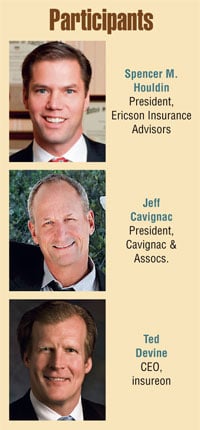 What services or lines of business are you focusing on for growth in 2013?
What services or lines of business are you focusing on for growth in 2013?
Spencer M. Houldin: We have particular focus on personal insurance for the high-net-worth consumer. These clients seek an insurance advisor with markets and product knowledge. We offer services, such as background checks for domestic employees and personal property inventory services, which are sought in this space. Given the competition for the commodity-based consumer, we are committed to growing our advisory-based customer numbers. An additional 2013 goal is to grow our group personal excess liability business with a particular focus on law firms.
Jeff Cavignac: We focus on our core competencies, which include the building industry (development, design and construction), real estate, manufacturing, non-profits and other industries we feel qualified to work with. We believe it is important to specialize in order to help clients effectively manage risk. We also plan to further develop our fee-based risk control services, specifically in the area of human resources.
Recommended For You
Want to continue reading?
Become a Free PropertyCasualty360 Digital Reader
Your access to unlimited PropertyCasualty360 content isn’t changing.
Once you are an ALM digital member, you’ll receive:
- Breaking insurance news and analysis, on-site and via our newsletters and custom alerts
- Weekly Insurance Speak podcast featuring exclusive interviews with industry leaders
- Educational webcasts, white papers, and ebooks from industry thought leaders
- Critical converage of the employee benefits and financial advisory markets on our other ALM sites, BenefitsPRO and ThinkAdvisor
Already have an account? Sign In Now
© 2025 ALM Global, LLC, All Rights Reserved. Request academic re-use from www.copyright.com. All other uses, submit a request to [email protected]. For more information visit Asset & Logo Licensing.








